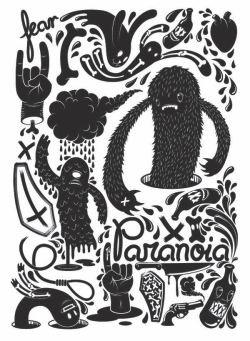| Home - Back Issues - The Team - Contact Us |
 |
| Volume 11 |Issue 35| September 07, 2012 | |
|
|
Health Persecution or Delusion? Anika Hossain
An example of a paranoid thought process could be as follows: My best friend said she would call me on Friday. It is now 6pm on Friday and she has not called. Maybe she does not really want to call me. Maybe she is avoiding me. It is now 8 pm and she still has not called. Maybe she is angry with me about something. Maybe she has told all my other friends bad things about me because they haven't called either. Maybe she has been in an accident. It is 10 pm and she still has not called. She hates me and will never call again. I called another friend and she hasn't answered. They're all plotting against me. I feel scared and threatened. I cannot sleep tonight. What started out as a rational thought turned into something completely irrational, showing us that paranoia primarily involves a fear that something bad will happen, for which other's are responsible, and this belief is extremely exaggerated and not based on facts. The central thought which is present in all forms of paranoia is a sense of threat, either emotional or psychological (bullying or spreading rumours), physical (murder, rape etc) or financial (theft, property damage, trickery etc). A paranoid person may feel threatened by an individual, several people, an organisation or even inanimate objects. The symptoms of paranoia include feelings of stress, feelings of extreme fear, suspicion, feelings of being victimised, feelings of isolation and exhaustion from worrying constantly. If paranoia is of short duration, a person may have some insight into their problem. They may realise their worries are actually groundless. If the paranoid thoughts have been experienced for a long period of time and the thoughts are more extreme, a person will believe that their fears are real. This can be very isolating as these people cannot share their feelings with others as it is likely they won't be believed. This is extremely distressing and can worsen the problem.
Paranoia often leads to anxiety and depression, however it is not currently recognised as a diagnosis on its own. Severe paranoid thought are seen as symptoms of certain mental health problems, paranoid schizophrenia being one of them. This involves extreme paranoid thoughts, hearing voices which may mock or threaten a person, causing them to believe that their threat is real. The afflicted person may also have a sense of importance about themselves and think of themselves as a powerful religious figure or royalty who is being persecuted. Delusional or paranoid disorder is also a psychological problem which is accompanied by paranoia. This involves a person developing a dominating, complex paranoid idea that causes him/her to suspect everyone around them. These persons are more likely to seek legal help or help from the law enforcement as they feel their persecution is very real. Paranoid personality disorder is next on this list. This involves a person being paranoid for a long period of time, perhaps since childhood. This person will be suspicious all the time and find it difficult to trust people. This person will also have a strong belief that people are plotting against him/her and will have little insight into their problem. People diagnosed with bipolar disorder (mood disorders), post-natal psychosis and severe anxiety or depression may also suffer from paranoia. Paranoia can be caused by several factors. Life events, such as a sudden increase in stress due to say a lost job or failed relationship, a robbery at home or a bully at school may leave one feeling insecure and unsafe, which is the root of paranoia. Living in an isolated or lonely environment, being constantly exposed to media reports of crime, violence etc, may also trigger feelings of paranoia. Anxiety can put one on edge while depression can lower one's self-esteem, which can make one misinterpret other peoples' intentions. The lack of sleep can also affect one's feelings of paranoia as fears develop late at night when one is left alone with their thoughts. Drugs such as cannabis, ecstasy and other amphetamines as well as alcohol can trigger paranoia. Childhood traumas as well as physical illnesses such as Parkinson's disease, strokes, Alzheimer's disease as well as hearing loss may also trigger paranoia. There are ways to control one's paranoid thoughts but these techniques must be applied along with other psychological counseling, therapy and medications if needed.
Improving one's lifestyle, such as eating better, sleeping well, keeping in touch with people, being social, exercising regularly, doing yoga, getting plenty of rest and meditating may improve one's sense of overall well being and help one cope with fears when they arise. Avoiding recreational drugs and excessive consumption of alcohol will also help reduce anxiety levels and make it easier to rationalise one's feelings. Keeping a diary to monitor one's thought process may also help rationalise and understand feelings. This may also help one identify triggers that cause paranoia and avoid them in the future. Considering one's reactions and assessing them is also very helpful. For example, when one's friend has not called (see first example) as promised, the rationalisation can be as follows: My best friend did not call on Saturday, but she called on Sunday and said she had been caught up in work and apologised for not calling earlier. My other friend also called me back and said she was asleep when I called her. It was late at night so this must be true. They both made plans to spend time with me this week so this must mean they are not angry with me or avoiding me. Not all my friends know each other so they cannot be plotting against me together. My previous reaction was exaggerated and irrational. Once one makes this assessment they can seek professional help from psychiatrists, seek group therapy, go to support groups, take medication and whatever else is required. Family and a strong network of friends is also important to help one through these troubled times. If the symptoms of paranoia are detected at an early stage, it is possible to manage it better. Therefore it is important to monitor oneself and identify the problem before it can escalate.
|
||||
Copyright
(R) thedailystar.net 2012 |
 P
P
